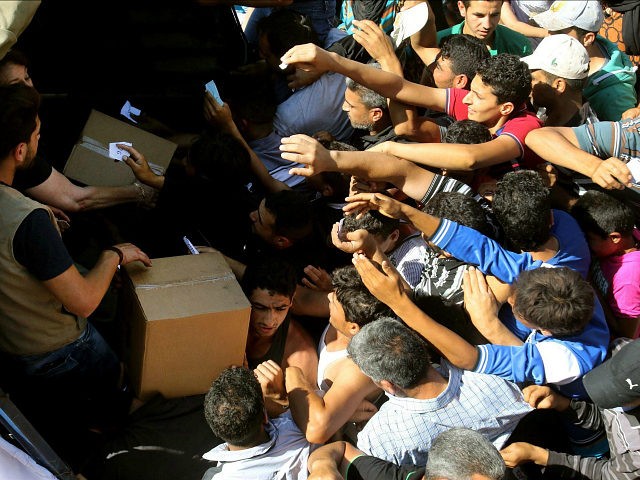The Russian Defense Ministry proposed a plan this week for working with the United States to return Syrian refugees living in Jordan, Lebanon, Turkey, and other regions back to their homes.
Russian General Mikhail Mizintsev said the proposals for Syrian refugees “take into account the agreements reached by the Russian and American presidents during their meeting in Helsinki.”
Radio Free Europe noted this statement aligns with a press conference given by U.S. Secretary of State Mike Pompeo on July 20 in which he said Presidents Donald Trump and Vladimir Putin discussed the Syrian crisis and “how we might get the refugees back.”
“The proposed joint plan of action on refugees is remarkable in that it appears to presuppose that the war is coming to an end without a negotiated settlement and the country is now in a resettlement and reconstruction phase – a view often espoused by Russia but not previously openly endorsed by Washington,” RFE observed.
If the Russian proposal is approved by the Trump administration, it could also be an unprecedented agreement to resettle refugees without significant involvement from the United Nations. General Mizintsev outlined a plan for Russia and the United States to work directly together on rebuilding Syria’s devastated infrastructure and partner with Jordan to facilitate the return of millions of refugees currently camped in Jordan and Lebanon. The plan would then expand to resettle refugees living in Turkey, Europe, and the United States.
The initial U.S. response to the Russian proposal was tepid at best. Speaking to reporters during a trip to the region on Sunday, Central Command chief Gen. Joseph Votel said he wanted to see more “confidence-building measures” from Russia before working together on reconstruction or refugee resettlement.
“I would want to make sure that this isn’t something that we stepped into lightly,” said Votel, adding that he has received no guidance on the matter from the White House since the Helsinki summit.
“You don’t just go do things. I have not asked for that. I am not recommending that. And that would be a pretty big step at this point,” Votel said of the Russian proposal.
He indicated that “confidence-building” would not be an easy task for Moscow: “I’ve watched some of the things that Russia has done. It does give me some pause here. These are not things that give me great confidence that just by stepping over into the next level of coordination that things are going to be fine.”
On the other hand, the Daily Star of Lebanon reported on Monday that Lebanese officials are already scheduling meetings with their Russian counterparts to “set the framework, the method, suggestions, and possibilities” for refugee resettlement.
George Chaaban, a top adviser to the Lebanese prime minister for Russian affairs, met with Russian Deputy Foreign Minister Mikhail Bogdanov on Saturday to promise enthusiastic cooperation from Lebanon.
“The Russians are serious as a result of the agreement that took place in Helsinki between presidents Trump and Putin. The Europeans are also interested in this issue,” Chaaban asserted. “What I can say is that this time this project is serious and is internationally supported.”
The Daily Star did not list any specific European powers that are “interested” in Russia’s proposal. The Russians have been prodding Europe to pay for Syrian reconstruction all this year. The European Union responded with annoyance that Moscow expects it to clean up the debris from Russia’s war in Syria, and deep suspicion that a great deal of European money would be siphoned into Russian companies that would handle most of the reconstruction work.
A major obstacle to Russia’s bilateral proposal for Syrian refugees is the 2014 National Defense Authorization Act, which was passed after Russia annexed Crimea. The law strictly limits American cooperation with Russia until Russia ceases occupying Ukrainian territory and threatening its sovereignty. This would seem to foreclose any cooperation more extensive than the deconfliction hotline that keeps Russian and American commanders aware of each others’ activities in Syria to prevent inadvertent hostile contact.

COMMENTS
Please let us know if you're having issues with commenting.